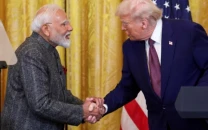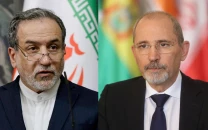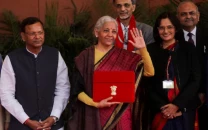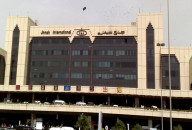Building bridges with Afghanistan
To achieve real progress with Afghanistan, we must see things more clearly in bilateral terms, stop playing proxies.

The writer is a retired lieutenant general of the Pakistan Army and served as chairman of the Pakistan Ordnance Factories Board
Foreseeing the benefits of mending relations with the western neighbour for common good, Nawaz Sharif has accorded it a high priority and has had three summit meetings with President Hamid Karzai in the last six months. Clearly, there lies an opportunity for both countries to cash in on this positive momentum.
As we have seen, high-level personal engagement between Afghanistan and Pakistan is necessary to set the tone and direction of the relationship. But to truly transform it into an enduring and stable one, it has to be based on institutional linkages at the political, economic and security level, which currently are either nominal or non-existent. The parliamentarians of the two countries have been meeting and have even formalised their ties in certain areas, but much more can be done in clearing misgivings and influencing policy formulation that is mutually beneficial.
In the economic field, increased trade and commerce and development of energy and transit corridors could bind the countries more positively and allow them to benefit from their geostrategic location. Economic benefits can create an urge for new regionalism and place the relationship on a sound footing.
Cultural exchanges and common sports activities can bring about a more relaxed and humane attitude towards each other.
On issues of security, there is still considerable distrust and mutual recrimination. Notwithstanding the prime minister’s repeated overtures of goodwill and cooperation to President Karzai, there is a perception in the Afghan leadership that the Pakistan Army is the one which formulates policy. The Afghan government’s expectations are that Pakistan will influence reconcilable Afghan Taliban to engage in negotiations, but the Pakistan military fears that this will be perceived by the Taliban leadership as a divisive tactic and consequently deprive it of whatever influence it exercises over them.
While the Pakistan Army realises that the Afghan Taliban are an important factor, it is not inclined to put all its eggs in one basket and fully endorses the prime minister’s policy to broaden engagement with major stakeholders in Afghanistan. In fact, with the advantage of hindsight, the military and political leadership is more realistic today and understands that there are dangers in being too close to the Taliban: even those who harbour no anti-Taliban feeling are cautious about embracing them. They foresee the danger of an emerging nexus between Pakistani militants and the Afghan Taliban with jihadi and sectarian groups aligning against the Pakistani state.
If the Afghan Taliban and Afghan government do not succeed in finding a negotiated settlement, the fallout on Pakistan in the form of refugee influx and strengthening of militants could be destabilising. What the two governments cannot overlook is that Pashtuns are dying on both sides of the border and the crisis and instability generated over the years can only be brought under control through a cooperative approach.
A negotiated settlement with the Taliban before the US withdrawal would be best for Afghanistan and regional countries, but the question is, will President Karzai or his successor be interested in negotiations even if there exists more support for negotiations with the Taliban in the Afghan parliament than one might imagine? If the Taliban were to share power with the Afghan government, it would mean a dilution of Karzai’s power and that of the Northern Alliance.
The Americans do not have the time, patience or genuine interest in having negotiations with the Taliban. Their primary interest is to have as orderly a withdrawal as possible and the elimination of al Qaeda. The residual elements of al Qaeda and other top insurgent leaders will be dealt with by the use of drones and a ground based intelligence network.
Better relations with Afghanistan will give Pakistan a greater sense of security in its relations with India. Our relations with Afghanistan are still seen through the prism of relations with India but to achieve real progress with Afghanistan, we must see things more clearly in bilateral terms, and both countries should stop playing proxies. We need to focus on our own national interests and those where we depend on each other in important ways: our shared economic interests, security, political stability and social cohesion.
Border management between the two countries has become extremely problematic, as both Afghanistan and Pakistan have only partial control over the territories adjoining each other’s border. In the south and east of Afghanistan, militants and warlords are in control and the Afghanistan government’s writ is practically non-existent. Similarly, on the Pakistani side in North Waziristan, the state’s writ is nominal.
Pakistan’s proposal to fence the Afghan border was a non-starter as Pashtun tribes on both sides have relatives and families. Fencing also raises the politically sensitive issue of the Durand Line. Despite these difficulties, the two governments should work towards greater coordination through periodic meetings of local commanders, sharing intelligence and clearing militant sanctuaries close to the border to block and frustrate their movement. It is only when the Afghan Army with the support of the residual US forces provides an anvil that the Pakistan Army will be in a position to launch successful operations in North Waziristan and other similar pockets of resistance.
Afghanistan is on the cusp of a consequential political and economic transition. Pakistan, too, is in a state of transition. This provides both countries a great opportunity to revisit the policies of the past and make a new beginning towards peaceful coexistence and good neighbourliness.
Published in The Express Tribune, December 18th, 2013.
Like Opinion & Editorial on Facebook, follow @ETOpEd on Twitter to receive all updates on all our daily pieces.



















COMMENTS
Comments are moderated and generally will be posted if they are on-topic and not abusive.
For more information, please see our Comments FAQ